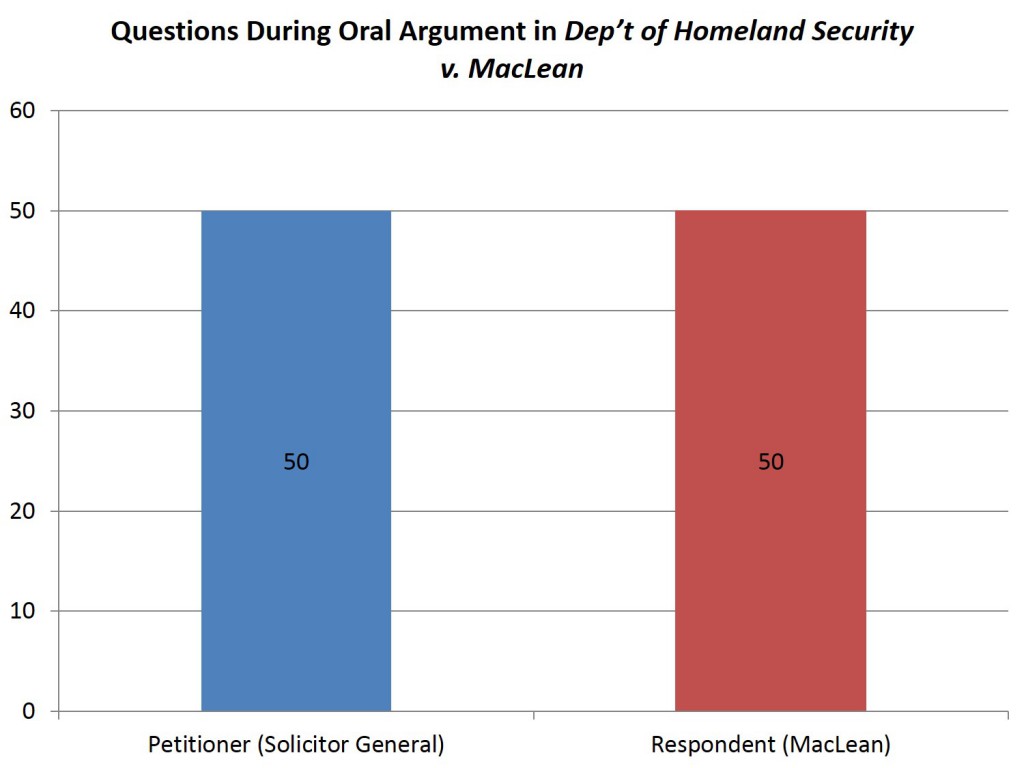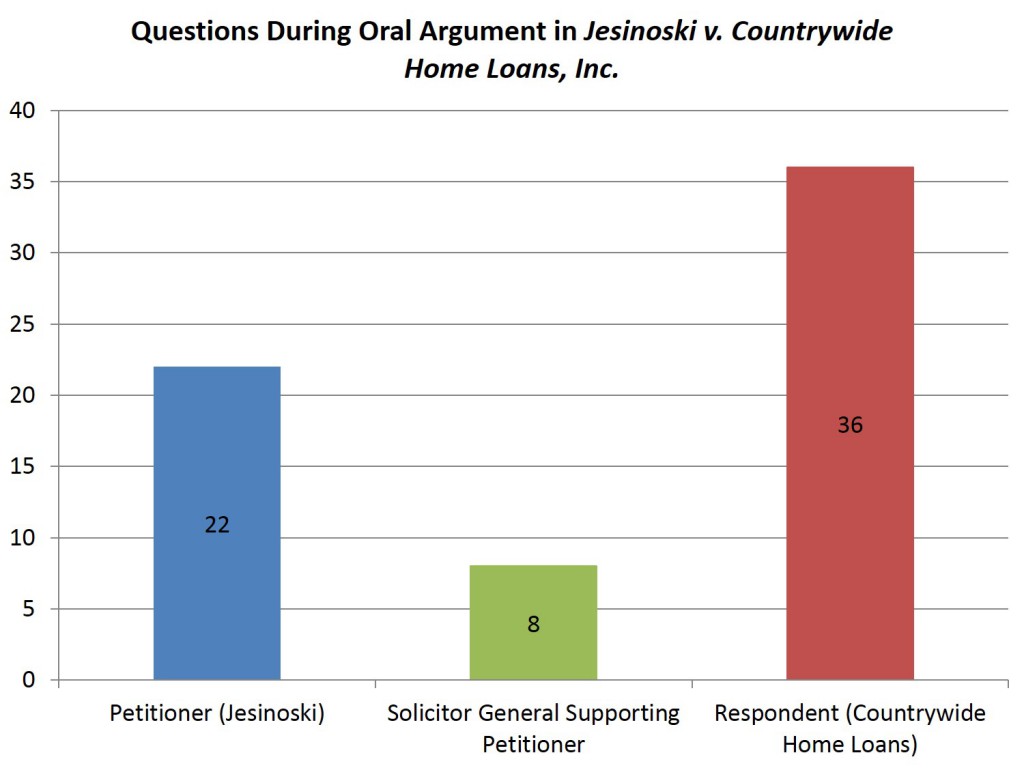The Supreme Court heard oral argument in two cases on Tuesday. I’m predicting the winners of the Supreme Court cases based on the number of questions asked during oral argument. Studies have shown that the advocate who receives more questions during oral argument is more likely to lose. For more about this method, see my post on last Term’s Aereo case.
Dep’t of Homeland Security v. MacLean asks whether certain statutory protections codified at 5 U.S.C. § 2302(b)(8)(A), which are inapplicable when an employee makes a disclosure “specifically prohibited by law,” can bar an agency from taking an enforcement action against an employee who intentionally discloses Sensitive Security Information (SSI).
This is a very close call. The Court was very active in questioning both sides. By my count, each side received an equal number of questions (50), which is a relatively high number of questions for oral argument. If you break down the questions asked by Justice, 4 Justices (Scalia, Kennedy, Alito, and Kagan) asked the Petitioner fewer questions, although the differential was not great for Justices Scalia and Alito, who asked the Petitioner only 2 fewer questions. Two Justices (Roberts and Ginsburg) asked the Respondent fewer questions (6 and 5 fewer questions, respectively). Justices Breyer and Sotomayor asked both sides an equal number of questions (10 and 9, respectively). Justice Thomas asked no questions.
My confidence level is not high in predicting the winner. It appears to be a very close case. Justices Breyer and Sotomayor asking both sides an equal number of questions makes this case even harder to predict. Nonetheless, if I had to choose, I would give a slight nod to the Petitioner (Solicitor General) based on the higher number of Justices (4) who asked the Petitioner fewer questions.
Figure 1.

The second case, Jesinoski v. Countrywide Home Loans, Inc., asks whether a borrower exercises his right to rescind a transaction in satisfaction of the requirements of the Truth in Lending Act, 15 U.S.C. § 1635, by “notifying the creditor” in writing within three years of the consummation of the transaction, as the Third, Fourth, and Eleventh Circuits have held; or whether the borrower must instead file a lawsuit within three years of the consummation of the transaction, as the First, Sixth, Eighth, Ninth, and Tenth Circuits have held.
This case is easier to predict. The Court asked the Petitioner (Jesinoski) 18 questions, the Solicitor General supporting the Petitioner 8 questions, and the Respondent (Countrywide Homes Loans) 36 questions. The total question count suggests a win for the Petitioner, who argued that a borrower exercises his right to rescind a transaction in satisfaction of the requirements of the Truth in Lending Act, 15 U.S.C. § 1635, by “notifying the creditor” in writing within three years of the consummation of the transaction.
If you break down the questions asked by Justice, the tally also favors the Petitioner. Five Justices (Roberts, Scalia, Ginsburg, Breyer, and Kagan) asked the Petitioner’s side (including the SG) fewer questions, although Roberts, Ginsburg, and Kagan asked just one fewer question. Also significant is the fact that Chief Justice Roberts and Justice Breyer asked no questions at all—somewhat a rarity—to Petitioner or the SG supporting Petitioner. Only Justice Alito asked Respondent significantly fewer questions (0 questions to 7 to the Petitioner’s side). The SG’s support is another plus factor for the Petitioner’s position. In short, I predict a victory for the Petitioner.
Figure 2.


I suppose you count friendly questions? Every recap of the argument in McLean predicts McLean will win pretty handily, and looking at the transcript he did receive a fair number of friendly questions.
Yes, I don’t distinguish friendly questions. Just count any question asked. The prognosticators may be right in analyzing the substance. I’m sticking to the numbers. This case was hard to judge just based on the numbers.
Wow,did you miss the Jesinoski case by a country mile.Did you not read any of the tila statutes or study this case. Your credibility took a huge hit here! 9-0, in other words unanimous.da!
FYI My method is to base my prediction on the question count (overall and/or by Justice). I don’t actually read the questions (other than to determine if there is a question), the statutes, or the law. I know that it sounds like a crazy method, but other scholars have proven that there is a statistically significant correlation there. So far, I’m 88% correct.